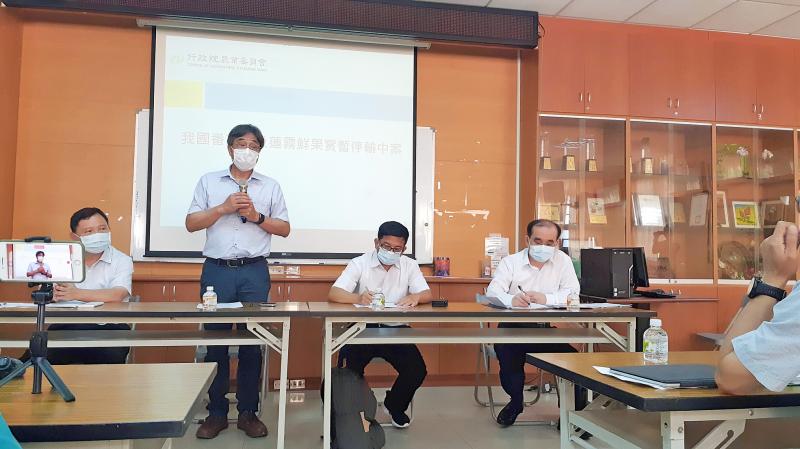The Council of Agriculture (COA) yesterday said it is hoping to resolve technical issues with China concerning plant quarantines based on WTO norms, following Beijing’s ban on the importation of custard apples and wax apples from Taiwan.
Chinese customs authorities on Sunday said that the country would suspend the importation of custard apples and wax apples from Taiwan starting on Monday, citing mealybug infestations in shipments of those fruits on “multiple occasions” this year, without providing any other details.
Asked what Taiwan could do to help local growers affected by the ban other than providing subsidies and promoting domestic sales, COA Minister Chen Chi-chung (陳吉仲) said there is precedent for handling such issues with Beijing.

Photo: Huang Ming-tang, Taipei Times
For example, China suspended the importation of longan from some Thailand-based packaging companies in March and again on Aug. 13, but it lifted the ban on some of those companies on Aug. 17 after Thailand provided additional documentation, Chen said.
Based on that model, Chen said he hopes that Taiwan and China can address the dispute based on WTO norms.
The agency told Chinese authorities on Sunday that it hoped the two sides could exchange views on technical issues related to animal and plant quarantines, Chen said.
However, it remains unclear how willing Beijing would be to engage in such an exchange, given the state of cross-strait relations and the lack of communication over China’s ban on Taiwanese pineapples in late February.
Shortly after China’s announcement, Chen had said that the council might take the wax apple and custard apple case to the WTO.
However, he stopped short of reiterating that statement yesterday.
He said that the council had put other measures in place in response to the ban, including a plan to develop new marketing channels for domestic sales and exports through an e-commerce platform.
Moreover, the council later yesterday was to hold forums with local growers in Kaohsiung, and Taitung and Pingtung counties to explain its strategy to strike a balance between production and sales, he said.

An essay competition jointly organized by a local writing society and a publisher affiliated with the Chinese Communist Party (CCP) might have contravened the Act Governing Relations Between the People of the Taiwan Area and the Mainland Area (臺灣地區與大陸地區人民關係條例), the Mainland Affairs Council (MAC) said on Thursday. “In this case, the partner organization is clearly an agency under the CCP’s Fujian Provincial Committee,” MAC Deputy Minister and spokesperson Liang Wen-chieh (梁文傑) said at a news briefing in Taipei. “It also involves bringing Taiwanese students to China with all-expenses-paid arrangements to attend award ceremonies and camps,” Liang said. Those two “characteristics” are typically sufficient

A magnitude 5.9 earthquake that struck about 33km off the coast of Hualien City was the "main shock" in a series of quakes in the area, with aftershocks expected over the next three days, the Central Weather Administration (CWA) said yesterday. Prior to the magnitude 5.9 quake shaking most of Taiwan at 6:53pm yesterday, six other earthquakes stronger than a magnitude of 4, starting with a magnitude 5.5 quake at 6:09pm, occurred in the area. CWA Seismological Center Director Wu Chien-fu (吳健富) confirmed that the quakes were all part of the same series and that the magnitude 5.5 temblor was

The Central Weather Administration has issued a heat alert for southeastern Taiwan, warning of temperatures as high as 36°C today, while alerting some coastal areas of strong winds later in the day. Kaohsiung’s Neimen District (內門) and Pingtung County’s Neipu Township (內埔) are under an orange heat alert, which warns of temperatures as high as 36°C for three consecutive days, the CWA said, citing southwest winds. The heat would also extend to Tainan’s Nansi (楠西) and Yujing (玉井) districts, as well as Pingtung’s Gaoshu (高樹), Yanpu (鹽埔) and Majia (瑪家) townships, it said, forecasting highs of up to 36°C in those areas

The brilliant blue waters, thick foliage and bucolic atmosphere on this seemingly idyllic archipelago deep in the Pacific Ocean belie the key role it now plays in a titanic geopolitical struggle. Palau is again on the front line as China, and the US and its allies prepare their forces in an intensifying contest for control over the Asia-Pacific region. The democratic nation of just 17,000 people hosts US-controlled airstrips and soon-to-be-completed radar installations that the US military describes as “critical” to monitoring vast swathes of water and airspace. It is also a key piece of the second island chain, a string of